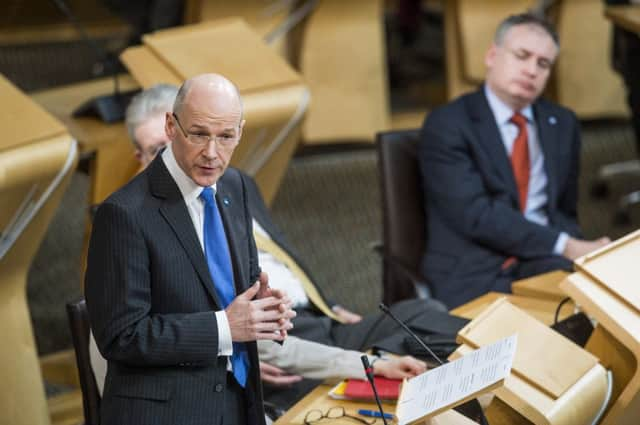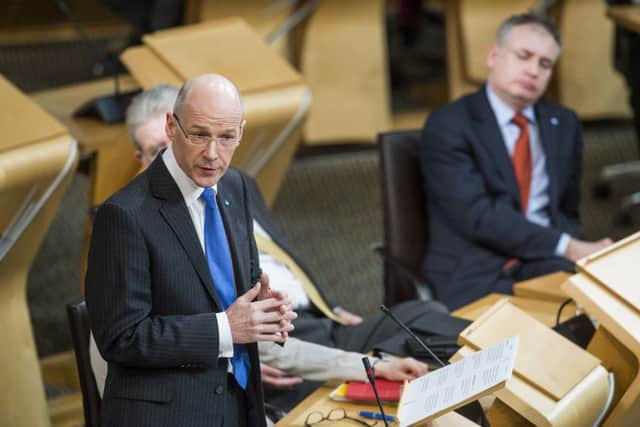SNP and Labour will agree to end bedroom tax


Labour staged a surprise U-turn yesterday to back the last Scottish Budget before the independence referendum, in an effort to ditch the controversial welfare reform.
Holyrood’s two biggest parties have previously been at loggerheads over the best way to deal with the reform, which they both oppose and which affects about 80,000 Scots.
Advertisement
Hide AdAdvertisement
Hide AdAs the government’s 2014-15 spending plans were discussed at Holyrood yesterday, Labour finance spokesman Iain Gray told MSPs that talks with finance secretary John Swinney were taking place that could result in the removal of the spare room subsidy – the bedroom tax – being axed.


Mr Gray said: “Mr Swinney was courteous enough to invite us to meet him and discuss the Budget. We were clear that this was a change we wanted to see.
“He agreed to work with us on how a legal way to do this could be found. Those meetings have started. I believe those meetings have been constructive.
“We can set our differences aside and do this thing on which we agree.”
Labour agreed to support the Budget despite having previously voted against central measures for extra childcare and free school meals for younger primary pupils in Holyrood earlier this month.
Labour will now push for measures in the final Budget that will “consign the bedroom tax to history in Scotland, right here and right now”.
The UK government decision to withdraw the spare room subsidy for council tenants has been the most controversial of the coalition’s welfare reforms.
It means working-age people renting from councils or housing associations lose up to a quarter of their housing benefit if officials decide they have more bedrooms than they need. About £15.4 million was claimed by struggling tenants in emergency housing benefits between April and November last year – a fourfold increase on all of 2012.
Advertisement
Hide AdAdvertisement
Hide AdScotland’s two main parties have clashed over the best way to tackle the bedroom tax. New laws being proposed by Labour’s Jackie Baillie have failed to win SNP support, while Nationalist councils claim Labour has failed to match their commitment not to evict anyone on the basis of the measure.
Labour says about £50m is needed to help hard-up Scots who have fallen into arrears. The SNP government has already set aside £20m to ease the impact of the tax on those hit hardest hit.
But Mr Swinney warned yesterday that explicit guidance to councils from the Department of Work and Pensions made it clear there was a limit to the level of assistance that can be provided to individuals under the current regime.
The finance secretary said: “The crucial test is can we get the money to the individuals to remove the arrears?
“What that guidance from the DWP states, consistent with the discretionary housing grants order, is that there is a limit on that. Having said all of that, I want to continue discussions with the Labour Party about the pursuit of the practical option.”
He added: “We will have further discussions about these points, but what’s crucial is that we find a way of tackling the hardship experienced by individuals in a fair and effective way that meets their needs and helps us to deal with the iniquity of the bedroom tax.”
Labour says this could be done through the government’s responsibilities to cut homelessness, support housing associations or through councils’ “general power of wellbeing”.
The Budget was promoted as focusing on key infrastructure, such as hospitals and schools, while tackling poverty. It also confirms plans for £59m over two years to provide more free childcare places, taking the total extra money for childcare over that period to about £250m.
Advertisement
Hide AdAdvertisement
Hide AdFunding of £55m over two years for free school meals for youngsters in primaries one to three is set out in the bill as part of a £114m package of help for young people.
The Budget will also provide funds to expand a rates relief scheme for small businesses, as well as maintain the council tax freeze.
Conservative finance spokesman Gavin Brown said his party would not support the overall package. “This is not a Budget for the economy,” he said.
“They don’t even pretend to talk a good game about the economy any more. This is all about the referendum.”
Liberal Democrat leader Willie Rennie said the Scottish Government was getting it right on nursery education and school meals. “The Budget, even so, will still not be perfect,” he said. “It may be good enough for us to vote for the Budget – we will have to see how the discussions develop in the coming weeks.”
Green Party co-leader Patrick Harvie said extending free childcare and free school meals were “important steps in the right direction”, but he opposed other elements.
“The unsustainable transport projects which the government has pushed through, we have criticised completely,” he said.
The bill was backed at the first of three stages by 90 votes to 13, with two abstentions.
Advertisement
Hide AdAdvertisement
Hide AdTom Peterkin: Welfare a hot Holyrood topic, despite voter indifference
Those wanting an insight into the sort of economic issues likely to dominate the political landscape as the referendum approaches could do worse than have a squint at John Swinney’s last Budget before the big day.
On that basis, it is reasonable to assume the issue of welfare will feature prominently over the next eight months or so.
Yesterday was a day that saw the SNP administration and the main Labour opposition bending over backwards to outdo each other on measures to mitigate the impact of the so-called bedroom tax. Labour eventually backed the Budget, with a view to introducing measures to mitigate the bedroom tax when the bill reaches Stage III.
Compensating those who will suffer as a result of the UK government’s plans to scrap the spare room subsidy or introducing legislation to stop councils from enforcing the change are among the moves being explored by Labour.
Offering support to the SNP administration could be seen as an attempt to undo some of the political damage caused by Labour voting against key measures in the Budget, such as extra childcare measures, only a fortnight ago.
Iain Gray, former Labour leader and now its finance spokesman, did his best to reclaim the welfare issue, arguing the bedroom tax would be ended in 2015 if his party wins power at Westminster.
In the meantime, Gray warned it would be “dark days for the tenants” affected until this came about and revealed that talks were under way with ministers to determine how the bedroom tax could be effectively ditched in Scotland.
Advertisement
Hide AdAdvertisement
Hide AdWith the SNP arguing that the full powers of independence represent the best way of abolishing the bedroom tax, Gray was only too keen to emphasise that mitigating measures can be taken under the current settlement..
This week the Scottish Social Attitudes Survey suggested welfare is of “peripheral interest” the voters who will determine Scotland’s future on 18 September. Yesterday’s discussions at Holyrood would indicate that low level of interest does not apply to the political classes.
SEE ALSO